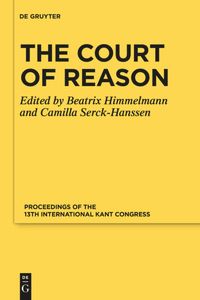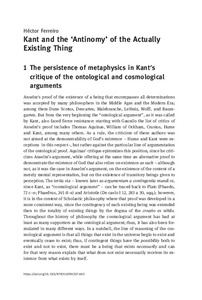Por favor, use este identificador para citar o enlazar este ítem:
https://repositorio.uca.edu.ar/handle/123456789/13911| Título: | Kant and the ‘antinomy’ of the actually existing thing | Autor: | Ferreiro, Héctor Alberto | Palabras clave: | Kant, Immanuel, 1724-1804; FILOSOFIA ALEMANA; EXISTENCIA; RAZON; IDEALISMO | Fecha de publicación: | 2021 | Editorial: | De Gruyter | Cita: | Ferreiro, H. A. Kant and the ‘antinomy’ of the actually existing thing [en línea]. En: Himmelmann, B., Serck-Hanssen, C. The Court of Reason : proceedings of the 13th International Kant Congress. Boston: De Gruyter, 2021. doi: https://doi.org/10.1515/9783110701357-043. Disponible en: https://repositorio.uca.edu.ar/handle/123456789/13911 | Resumen: | Anselm′s proof of the existence of a being that encompasses all determinations was accepted by many philosophers in the Middle Ages and the Modern Era; among them Duns Scotus, Descartes, Malebranche, Leibniz, Wolff, and Baumgarten. But from the very beginning the “ontological argument”, as it was called by Kant, also faced fierce resistance: starting with Gaunilo the list of critics of Anselm’s proof includes Thomas Aquinas, William of Ockham, Crusius, Hume and Kant, among many others. As a rule, the criticism of these authors was not aimed at the demonstrability of God’s existence – Hume and Kant were exceptions in this respect–, but rather against the particular line of argumentation of the ontological proof. Aquinas′ critique epitomizes this position, since he criticizes Anselm’s argument, while offering at the same time an alternative proof to demonstrate the existence of God that also relies on existence as such – although not, as it was the case in Anselm’s argument, on the existence of the content of a merely mental representation, but on the existence of transitory beings given to perception. The tertia via – known later as argumentum a contingentia mundi or, since Kant, as “cosmological argument” – can be traced back to Plato (Phaedo, 72 c–e; Phaedrus, 245 d–e) and Aristotle (De caelo I 12, 283 a 30, sqq.); however, it is in the context of Scholastic philosophy where that proof was developed in a more consistent way, since the contingency of each existing being was extended then to the totality of existing things by the dogma of the creatio ex nihilo. Throughout the history of philosophy the cosmological argument has had at least as many supporters as the ontological argument; thus, it has also been formulated in many different ways. In a nutshell, the line of reasoning of the cosmological argument is that all things that exist in the universe begin to exist and eventually cease to exist; thus, if contingent things have the possibility both to exist and not to exist, there must be a being that exists necessarily and can for that very reason explain that what does not exist necessarily receives its existence from what exists by itself... | URI: | https://repositorio.uca.edu.ar/handle/123456789/13911 | ISBN: | 9783110700701 | Disciplina: | FILOSOFIA | DOI: | 10.1515/9783110701357-043 | Derechos: | Acceso abierto | Fuente: | Himmelmann, B., Serck-Hanssen, C. The Court of Reason : proceedings of the 13th International Kant Congress. Boston: De Gruyter, 2021. |
| Aparece en las colecciones: | Libros/partes de libro |
Ficheros en este ítem:
| Fichero | Descripción | Tamaño | Formato | |
|---|---|---|---|---|
| portada-kant.jpg | 61,28 kB | JPEG |  Visualizar/Abrir | |
| kant-antinomy-actually.pdf | 97,79 kB | Adobe PDF |  Visualizar/Abrir |
Visualizaciones de página(s)
68
comprobado en 27-abr-2024
Descarga(s)
58
comprobado en 27-abr-2024
Google ScholarTM
Ver en Google Scholar
Altmetric
Altmetric
Este ítem está sujeto a una Licencia Creative Commons

